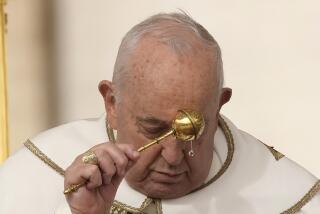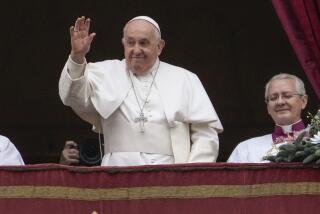Pope Francis delivers anti-terrorism message to open two-day visit to Egypt
- Share via
Reporting from CAIRO — Pope Francis on Friday won over his Egyptian audience with a few words, spoken in Arabic: “Peace be with you.”
“There is no justification for violence,” he said to applause at Al Azhar conference center in Cairo, adding that it’s the responsibility of clerics and other religious leaders to expose those responsible for extremist attacks.
“Together, from this land that is the place where civilizations converged, we must reaffirm our categorical rejection of all forms of violence, retaliation, and hatred that are perpetrated in the name of God,” he said to more applause, calling for brotherhood and reconciliation.
After he finished speaking, the pope turned and embraced Sheikh Ahmed Tayeb, the grand imam of Al Azhar mosque, the paramount seat of learning for Sunni Islam, in a moment that many in the audience later said moved them as much as the peaceful, anti-terrorism message presented by both religious leaders.
“Maybe we’re a bit emotional in Egypt,” said Mona Abdelhaseeb, 33, a researcher at Al Azhar, as she left. “But for someone who doesn’t speak Italian or Arabic, it’s all they need to understand.”
Francis arrived in Cairo earlier Friday for his two-day visit to the Muslim majority nation and emerged beaming from his plane to greet and bless a receiving line of supporters, including leaders of various faiths.
Prime Minister Sherif Ismail was the first to welcome the pope as he strode down a red carpet to the tarmac. There, a boy and girl approached with flowers, and the pontiff paused to bless them. He greeted others with kisses on the cheek.
Among those greeting the pope at the airport was Chaldean Christian Bishop Basilio Rialto of Baghdad. Rialto, who served for seven years as assistant pastor of a church in Michigan and has relatives in El Cajon, had said earlier that he knew Chaldeans all over the world were watching to see how the pope’s trip goes.
“We need the peace, especially in our country. The pope’s visit is going to give a lot of support, especially to Christians in the Middle East,” said Rialto, who has worn a silver cross like the one worn by the pope since he was ordained two years ago as bishop.
The pope traveled from the airport to the presidential palace to meet with President Abdel Fattah Sisi, who had declared a state of emergency after twin suicide bombings at Coptic Christian churches in separate Egyptian cities on Palm Sunday this month and vowed to fight Muslim extremism.
Sisi lauded Francis, expressing appreciation for “his noble humanitarian positions which unleash the power of hope in the hearts of people.”
The pope was also greeted by a trio of religious leaders, a rare convergence: Tayeb, the grand imam; Coptic Christian Pope Tawadros II and Ecumencal Patriarch Bartholomew, the spiritual leader of Eastern Orthodox Christianity.
It is the first papal visit to Egypt since John Paul II’s trip in 2000, and comes at a particularly tense time after attacks on the country’s Christian minority, including the Palm Sunday attacks that killed 47 people.
Islamic State extremists this year declared a campaign against Egypt’s Christians, who account for about 10% of the country’s population of 92 million, making the group the nation’s largest religious minority. About 270,000 of the country’s Christians are Catholic.
Outside Al Azhar, soldiers patrolled in armored vehicles. Guests were screened by guards, dogs and two metal detectors.
Al Azhar has a powerful influence on Sunni theology through its teachings, books and religious edicts. Its leaders took offense and severed ties with the Vatican in 2011 when Pope Benedict XVI demanded Egypt better protect Christians following a New Year’s Eve church bombing that killed more than 20 people.
Francis has improved relations, hosting Tayeb at the Vatican last spring. Their latest meeting comes at an opportune time for Tayeb, who faces pressure from Sisi and a pro-government media campaign accusing Al Azhar of failing to combat Islamic extremism, denouncing attacks but doing little to change conditions.
Arafa Ragab, an Al Azhar scholar, went to see the pope after leading Friday prayers at a nearby mosque, where he preached about the importance of compassion. He carried prayer beads and wore traditional robes and an Egyptian flag pin to show his patriotism.
Ragab, 30, said Al Azhar is evolving and welcomed the pope.
“I’m proud he’s here today and Al Azhar is unifying religions,” Ragab said. “We reject any people who preach extremism. This is my message, and now it’s going out to the entire world.”
Christians were also pleased to hear the pope condemn the growing threat of Islamic extremism. Coptic activists complain that despite the support of Sisi and other leaders, they still face discrimination, limits on church building and persecution that has driven families from their homes in rural areas.
“We should learn to live together,” said Father Dameskinos Keadeh, an orthodox priest from Syria based in Cairo.
Keadeh said he was moved as much by what the pope said as what he did, leaving Al Azhar to pray with the Coptic pope for victims of terrorism at St. Peter and St. Paul Church, where 29 Coptic Christians were killed by a suicide attack in December.
Many businesses near the church were shuttered, with parked cars cleared from surrounding streets by police worried about the possibility of an attack along the pope’s route.
But Osama Zahar stayed and watched the events on a television in his perfume shop.
“It is very, very important, not only for Egypt but also for the whole world, which it will bring peace and good,” Zahar, 60, who is Muslim, said of the pope’s visit. “I hope that everything goes peacefully without any attack against him.”
Zahar said he wished he could thank the pope and welcome him personally, adding that he admires the pontiff’s bravery and thinks it will encourage tourists to return to Egypt.
Later, riot police and small groups of well-wishers lined the pope’s route to the Vatican embassy on Gezira Island, where Francis was expected to meet hundreds of youths and spend the night.
Khadija Kalquaoui, 37, came to watch with her husband and three children. Her family is Muslim, she said, but the visit “is important for us, too.”
Eileen Bassioni is Catholic, her husband Muslim. Both came to see the pope, saying they admire his humility.
Standing nearby, neighbor Aida Dabizzi — a Bosnian agnostic — said it was the pope’s message that brought her and others out to see him.
“We think he is the true world leader in these tough times,” said Dabizzi, 37. “He’s able to bring peace wherever he goes.”
Twitter: @mollyhf
Special correspondent Makarios Nassar in Cairo contributed to this report.
ALSO
Civilian casualties from airstrikes grow in Iraq and Syria. But few are ever investigated
After deadly bombings, Egypt’s state of emergency reassures some but strikes fear in others
Conservative opposition to Pope Francis spurs talk of a schism in the Catholic Church
UPDATES:
3:15 p.m.: This article was updated with more details and comments on the pope’s trip.
11:40 a.m.: This article was updated with information on the pope’s speech in Cairo.
This article was originally published at 6:10 a.m.
More to Read
Sign up for Essential California
The most important California stories and recommendations in your inbox every morning.
You may occasionally receive promotional content from the Los Angeles Times.











